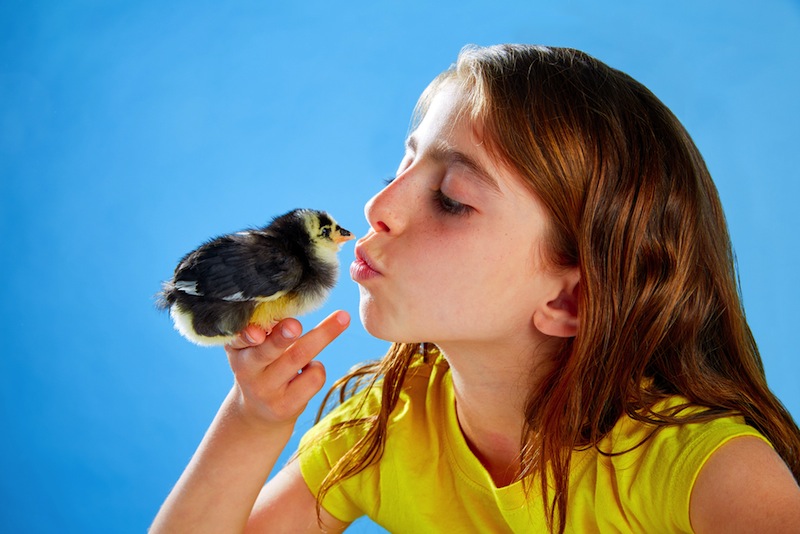
A number of people around the United States have become sick with Salmonella after bringing backyard chickens indoors, according to the Centers for Disease Control and Prevention.
And many of those people became ill from close encounters with their feathery friends, whether from having the birds in their homes, or nuzzling with them.
As of June 29, at least 181 people have come down with Salmonella during 2015, in four separate outbreaks spanning 40 states. Of the ill people who researchers reached for interviews, 86 percent reported having contact with baby chicks, ducklings or other live poultry. Many of those who had live poultry were keeping the chickens indoors as pets, or cuddling or kissing the animals. The live chicks came from multiple hatcheries in many different states, according to new data from the CDC.
Salmonella bacteria can cause diarrhea, fever and abdominal cramps anywhere from 12 to 72 hours after exposure. Although most people recover within a week, some may have such severe diarrhea that they must be hospitalized. If the bacterial infection enters the bloodstream, people can die unless they receive prompt treatment with antibiotics, according to the CDC. [Salmonella Outbreaks: 5 Tips for Cooking Chicken Safely]
These bacteria normally live in the guts of people and other animals, including poultry. Most people get sick by eating foods contaminated with the feces of an infected animal, according to the CDC.
However, ducklings and chicks that harbor Salmonella in their guts may wind up with the bacteria all over, covering everything from their downy coats to their environment. As a result, it's easy to get the disease simply by handling the creatures, according to the CDC. In the past, small turtles, dry pet food and even pet bearded dragons have been tied to Salmonella outbreaks.
To prevent transmission from live animals, people should avoid keeping their poultry indoors with them. And though baby chicks are pretty adorable, people should contain the urge to nuzzle or kiss the birds.
Get the world’s most fascinating discoveries delivered straight to your inbox.
Anyone who has contact with a live bird should wash his or her hands thoroughly with soap and water immediately afterward, the CDC warned.
Follow Tia Ghose on Twitterand Google+. Follow Live Science @livescience, Facebook & Google+. Original article on Live Science.

Tia is the editor-in-chief (premium) and was formerly managing editor and senior writer for Live Science. Her work has appeared in Scientific American, Wired.com, Science News and other outlets. She holds a master's degree in bioengineering from the University of Washington, a graduate certificate in science writing from UC Santa Cruz and a bachelor's degree in mechanical engineering from the University of Texas at Austin. Tia was part of a team at the Milwaukee Journal Sentinel that published the Empty Cradles series on preterm births, which won multiple awards, including the 2012 Casey Medal for Meritorious Journalism.


